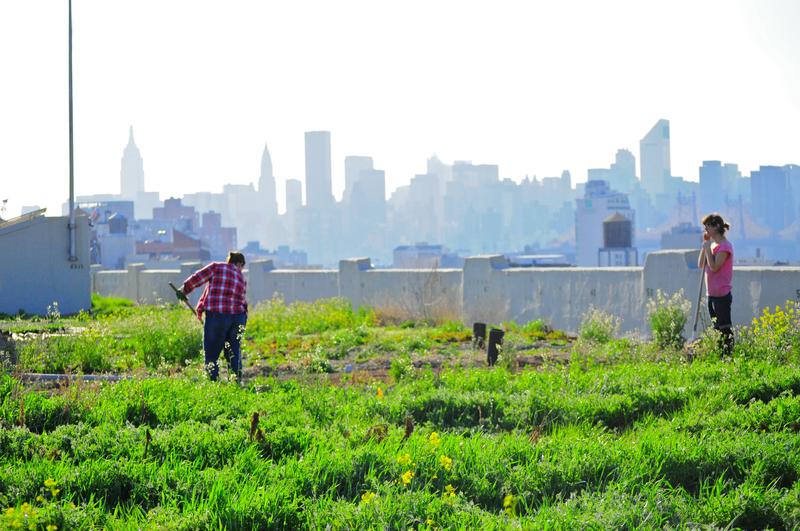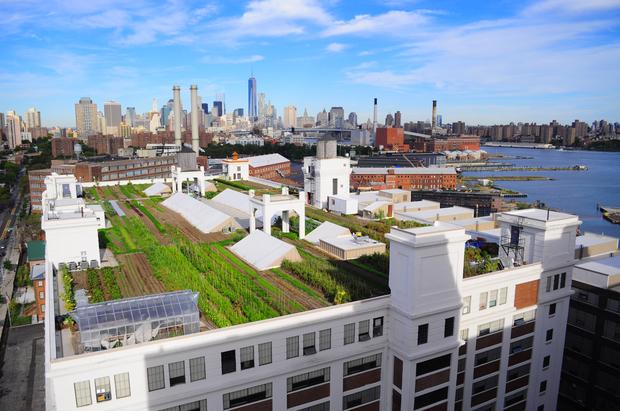
It's become common to hear of young New Yorkers who have quit their office jobs to start a farm. That transition typically involves leaving New York City for greener pastures in what's left of rural New Jersey or in Lower Hudson Valley counties like Columbia or Ulster.
But rather than going upstate, others have just gone up. To the roof.
That’s what Anstasia Cole Plakias did in 2010 when she and Ben Flanner co-founded Brooklyn Grange, an urban farm business that now includes rooftop farms in Long Island City, Queens and the Brooklyn Navy Yard. If you're a frustrated farmer who longs to grow your own food but you lack a backyard, Plakias said Gotham's rooftops are ripe for farming.
She and Flanner started their search for prime agricultural space by using Google Earth's satellite images to scan for big, flat, sunny rooftops. Once they found a few candidates, primarily in the industrial communities in the outer boroughs, they sussed them out in person.
“Five years ago today, we were riding around on our bikes in the snow and the rain and the slush, looking at every roof under the sun,” said Plakias. “We would just show up and try to get up there. We set off our fair share of alarms.”
What should an urban farmer look for? Plakias said the home grower can raise vegetables atop pretty much any roof, but for a commercial-scale farm like Brooklyn Grange, you need a very specific building. It needs to be big, it needs to be sturdy and it needs to have access to certain amenities.
- Size. “If you’re looking to produce enough food to create a return, employ people and pay rent (which you’re probably going to have to do if you’re going to convince a landlord to let you haul all that soil up there) you want enough scale. So you’re looking for a big building, it’s as simple as that.”
- Weight. Soil is heavy and wet soil is heavier. Even if you’re using a lightweight growing medium like Brooklyn Grange got from mushroom growers in Pennsylvania, you need a building that can bear serious weight. Look at the column spacing and talk to the building owner. Once you get serious, you’ll want to engage a structural engineer.
- Water. Up there in the sun, soil dries out quickly. Any farmer, rooftop or otherwise, will want an ample water source. Think about drains, too.
- Freight access is important. If you’ll be growing cases of squash and melons, you don’t want to have to haul them down flights of stairs.
- Power. Plakias said it’s not possible to harvest a full table's worth of food for a trip to the farmer's market first thing on a Saturday morning. She said you will need to pick your product the day before and keep it cool overnight. That means a walk-in cooler, which means electricity.
- Location, location, location. If you’re going to sell what you grow to restaurants and markets, Plakias said the "ideal spot" for your rooftop farm is in an industrial neighborhood near major highways and river crossings, like Long Island City (with quick access to the LIE, the Queens Midtown Tunnel, the RFK Bridge) or Sunset Park (think Gowanus Expressway, Verrazzano Narrows Bridge, Brookyn Bridge).
Plakias acknowledged that setting up a rooftop farm requires a lot of logistics, heavy lifting and infrastructure. Buying farmland in the Lower Hudson Valley is, in many respects, easier. But Plakias said she's a city girl, born and raised, and she wanted to stay here and bloom where she was planted. Plus, being on a Brooklyn Navy Yard rooftop with views across the East River of Lower Manhattan had other business advantages.
"We have yoga classes, composting, beekeeping workshops, we host weddings and dinner events," she said. "But more than anything, we’re adding green space to a community that’s sorely in need of it. We’re a learning laboratory for local kids to come up and actually step foot on a working farm. For those of us who attended NYC public school, that’s a rarity.”
In the five years since she searched by bicycle for the right roof, city psychology has changed. Instead of begging landlords to consider her project, it’s the other way around: “Now we’re getting calls from developers, landlords, brokers,” Plakias said. “It just goes to show that New Yorkers, just like everyone around the world, are more and more interested in reconnecting with their food production system.”
Check out our Farm School Resources page for more information about starting your own rooftop farm.

